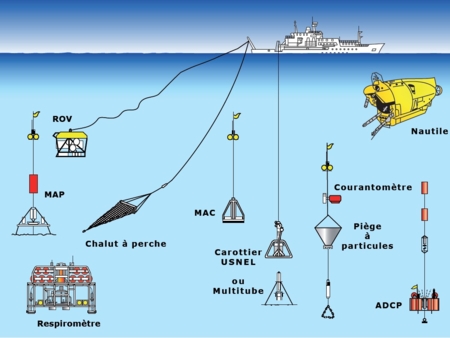Study of the microbial diversity of the deep anoxic hypersaline basins of the Eastern Mediterranean Sea
Since 1983, the existence of Deep Hypersaline anoxic basins (DHABs) has been revealed in the Eastern Mediterranean basin. These basins which represent extremes environments (anoxic, hypersalty, dark, high hydrostatic pressure) have been under investigation and increasing interest the last fifteen years. The molecular approaches revealed the presence of active and uncultivated microbial communities in the DHABs with two main metabolic processes such as methanogenesis and sulphate-reduction. Until now, no representative strain of the different uncultivated lineages thriving in the DHABs (ex : lineages MSBL, Mediteranean Sea Brine Lake) or involved in the two processes have been yet cultivated. The main objectives of the thesis work were to (i) identify the microbial key players in the processes of methanogenesis and sulphate-reduction, (ii) isolate new microbes adapted to hypersaline conditions and to study their physiology, (iii) to compare the genome and the physiology of the strains belonging to the genus Methanohalophilus, isolated from three different basins (Thetis, Kryos, Tyro), (iv) attempt to cultivate and isolate strains belonging to the uncultivated lineages described in the DHABs. Our cultivation approach allow to cultivate and isolate three methanogenic methylotrophic moderately halophile strains belonging to the genus Methanohalophilus from the basins Thetis, Kryos and Tyro. A chemo-taxonomic and genomic characterization of the isolates revealed the capacity of the strains to grow under in situ conditions. Genome analysis revealed the streamlining reduction (by 10%) of the 3 genomes of our deep sea isolates compared to the terrestrial species of the genus Methanohalophilus and also an adaptation of the isolates to the in situ conditions. The isolate SLHTYRO represent a new species of the genus for which we propose the name M. profundus strain SLHTYRO. Other microbial isolates belonging to genus Marinobacter, Halomonas, and Halanaerobium obtained could be involved in a syntrophic relationship with archaeal partners of the Methanohalophilus genus in order to produce methylated compounds from betaine which in turn is used as catabolic substrates in the methanogenesis process. A new strain belonging to a new genus affiliated the the Bacteroidetes phylum and phylogenetically close to clones identified in the DHABs has been cultivated and isolated in pure culture. This hard to grow isolate represents the first cultivated members of the diverse uncultivated lineages discovered in the DHABs.







